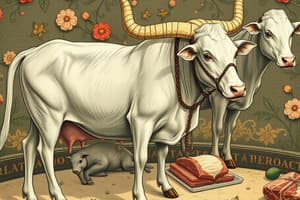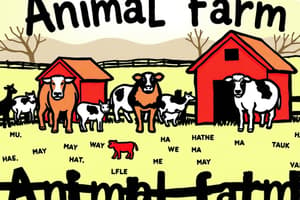Podcast
Questions and Answers
In 2020, the state of Wisconsin reported nearly 10,000 deer collisions.
In 2020, the state of Wisconsin reported nearly 10,000 deer collisions.
False (B)
Wildlife accidents only result in animal fatalities, not human injuries or fatalities.
Wildlife accidents only result in animal fatalities, not human injuries or fatalities.
False (B)
Installing wildlife crossings can help animals safely navigate roadways and avoid collisions with vehicles.
Installing wildlife crossings can help animals safely navigate roadways and avoid collisions with vehicles.
True (A)
Warning signs along roads cannot help motorists avoid wildlife collisions.
Warning signs along roads cannot help motorists avoid wildlife collisions.
Reducing speed limits in areas with high wildlife populations does not impact collision likelihood.
Reducing speed limits in areas with high wildlife populations does not impact collision likelihood.
Animal collisions are not a complex road safety issue with consequences for both human and animal populations.
Animal collisions are not a complex road safety issue with consequences for both human and animal populations.
Animal collisions with vehicles are a rare occurrence globally.
Animal collisions with vehicles are a rare occurrence globally.
Collisions between animals and vehicles can lead to animal fatalities, injuries, and costly vehicle damage.
Collisions between animals and vehicles can lead to animal fatalities, injuries, and costly vehicle damage.
Road safety is not a significant factor in reducing animal collisions.
Road safety is not a significant factor in reducing animal collisions.
Warning signs, crossings, and fencing are examples of road safety measures to prevent wildlife-vehicle collisions.
Warning signs, crossings, and fencing are examples of road safety measures to prevent wildlife-vehicle collisions.
Many states maintain reports on wildlife-vehicle collisions to understand the types of animals involved and their locations.
Many states maintain reports on wildlife-vehicle collisions to understand the types of animals involved and their locations.
Wildlife accidents do not have any impact on ecosystems or species populations.
Wildlife accidents do not have any impact on ecosystems or species populations.
Flashcards are hidden until you start studying
Study Notes
Animal Collisions: Understanding Road Safety Challenges
Every year, millions of animals are involved in collisions with vehicles across the globe. These encounters, often tragic for both the animals and motorists, underscore the complexity of human-wildlife coexistence. Let's delve into the topic of animal collisions, exploring road safety, state collision reports, wildlife accidents, and measures to prevent these encounters.
Animal Collisions
Collisions between animals and vehicles are a frequent occurrence and can result in animal fatalities, injuries, and costly vehicle damage. This issue is not only a concern for drivers and passengers but also for the wildlife population, as collisions can disrupt ecosystems and lead to declines in species.
Road Safety
Road safety is a crucial consideration in mitigating animal collisions. Vulnerable animals, such as deer, moose, and elk, are often the species most commonly involved in collisions. Their size and behavior make them particularly susceptible to these accidents. Road safety measures like warning signs, crossings, and fencing can help to reduce the number of wildlife-vehicle collisions.
State Collision Reports
Many states maintain wildlife-vehicle collision records. These reports offer valuable insights into the types of animals involved in collisions and the locations where they occur. For example, the state of Wisconsin reports that deer collisions are a significant issue, with nearly 20,000 reported collisions in 2020 alone. The state of California keeps records of wildlife-vehicle collisions, including species such as black bears and mountain lions.
Wildlife Accidents
Wildlife accidents can have devastating consequences. Not only do these events result in animal fatalities, but they can also lead to severe injuries and fatalities for motorists. For instance, deer collisions account for thousands of injuries and fatalities each year in the United States, with over 200 people losing their lives due to these accidents in 2019.
Preventing Collisions
Preventing collisions is a multifaceted challenge that involves several approaches. Here are some key strategies for reducing wildlife-vehicle collisions:
- Education: Educating motorists about the risks associated with wildlife-vehicle collisions and providing them with information about safe driving practices can help to reduce the number of accidents.
- Wildlife Crossings: Installing wildlife crossings can help animals safely navigate roadways and avoid collisions with vehicles.
- Warning Signs: Warning signs can alert motorists to the presence of animals in the area and help them to avoid collisions.
- Fencing: Installing fencing along roads can help to guide animals away from traffic and prevent collisions.
- Speed Limits: Lower speed limits in areas with high wildlife populations can reduce the likelihood of collisions and associated injuries.
- Removing Attractants: Reducing the availability of food sources in the vicinity of roads can help to discourage animals from crossing traffic.
In conclusion, animal collisions are a complex road safety issue with far-reaching consequences for both human and animal populations. By understanding the factors that contribute to these collisions and implementing targeted prevention strategies, we can work to reduce the number of accidents and protect both motorists and wildlife.
Studying That Suits You
Use AI to generate personalized quizzes and flashcards to suit your learning preferences.




